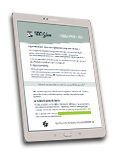Balancing Blood Sugar Tips to Stabilize Cortisol Levels

Cortisol is a hormone that plays a critical role in regulating blood sugar levels. When cortisol levels are elevated due to stress or other factors, blood sugar can become imbalanced, leading to a range of health issues. Balancing blood sugar levels is essential for stabilizing your cortisol levels and promoting overall health and wellbeing.
In this article, we’ll explore some tips for balancing blood sugar levels to stabilize cortisol, including dietary and lifestyle factors. We’ll also examine some of the science behind these tips and provide citations to support our claims.
Understanding Cortisol and Blood Sugar
Before we delve into tips for balancing blood sugar, let’s take a closer look at the relationship between cortisol and blood sugar. Cortisol is a hormone that is released by the adrenal glands in response to stress. It helps to regulate your blood sugar levels when they naturally dip by stimulating the liver to release glucose into the bloodstream. This is a normal autonomic physiological process that does not drive adrenal dysregulation.
However, when you experience an acute stressor the adrenals will be signaled to release epinephrine (adrenalin) and surge cortisol. This surge in cortisol will trigger a blood sugar and insulin surge.
If chronic stress is present, these surges in cortisol and blood sugar are inflammatory. It can also contribute to the development of chronic inflammation, which is a key factor in many chronic diseases and leaky gut.
Balancing Blood Sugar: Tips and Science
When we eat large meals, particularly those that are high in carbohydrates, our bodies release more insulin in response. This insulin response can lead to a rapid drop in blood sugar levels, triggering cortisol release.
By contrast, eating smaller, more frequent meals helps to keep your blood sugar levels stable throughout the day, reducing the risk of cortisol release. Some research has also suggested that eating a breakfast that is high in protein and low in carbohydrates may help to reduce cortisol levels in the morning.
There are two keys to balancing your blood sugar by eating small meals:
- The first is scheduling your meal times and eating at routine times. Start by having breakfast within 30 minutes of waking. If this is impossible, have 1-2 scoops of protein powder within 30 minutes and have breakfast within 60-90 minutes.
- The second is to include protein with each meal and snack. Protein actually tempers insulin secretion and will help stabilize blood sugar and adrenals, better than carbohydrates and fat.
Some research has also suggested that consuming omega-3 fatty acids, found in fatty fish, monounsaturated omega-9 fats, found in extra virgin olive oil and macadamia nut butter and ALA (an omega-3 precursor), found in nuts and seeds, may help to improve insulin sensitivity and reduce inflammation.
What about my morning coffee, you ask?
The caffeine in coffee stimulates the production of cortisol, which can cause a temporary increase in blood sugar levels (this is why this suppresses appetite). However, studies have also shown that caffeine can increase insulin sensitivity in some people, which can help to reduce blood sugar spikes over time. Try to keep coffee intake to one cup in the morning, and pair it with breakfast. This will buffer the effects of the caffeine on your blood sugar, insulin and cortisol.
If you have SIBO, along with blood sugar and cortisol dysregulation, you should think twice about fasting or worrying about meal timing with respect to your migrating motor complex. Stabilizing blood sugar and cortisol dysregulation comes first in the hierarchy of treatment. Otherwise you will have a difficult time clearing SIBO and rebalancing your gut microbiota.
Move your body – regular exercise can also play a key role in balancing blood sugar and stabilizing cortisol levels. Exercise has been shown to improve insulin sensitivity and glucose uptake in the muscles, which can help to prevent blood sugar spikes and reduce cortisol release.
In addition, exercise has been shown to reduce stress and anxiety, which can also contribute to elevated cortisol levels. Therefore, incorporating regular exercise into your routine, such as brisk walking, and moderate effort cycling, or strength training, can be an effective way to support healthy blood sugar and cortisol levels.
Getting enough sleep is essential for regulating cortisol levels and balancing blood sugar. When we don’t get enough sleep, cortisol levels can become elevated, which can lead to blood sugar imbalances. This is because sleep deprivation has been shown to impair glucose metabolism, leading to insulin resistance and higher blood sugar levels.
In addition, lack of sleep can also increase appetite and cravings for high-carbohydrate foods, which can further contribute to blood sugar imbalances. Therefore, it is important to aim for at least 7-8 hours of quality sleep per night to support healthy cortisol and blood sugar levels.
Finally, managing stress is essential for balancing blood sugar and stabilizing cortisol levels. Chronic stress has been shown to increase cortisol release, which can lead to blood sugar imbalances and other health issues. Finding effective ways to manage stress, such as meditation, yoga, or deep breathing exercises, can be an effective way to support healthy cortisol and blood sugar levels.
Balancing blood sugar levels is essential for stabilizing cortisol levels and promoting overall health and wellbeing. By following these tips, such as eating a balanced diet, eating smaller, more frequent meals, getting enough sleep, exercising regularly, and managing stress, you can support healthy blood sugar and cortisol levels. By incorporating these practices into your daily routine, you can take control of your health and wellbeing and reduce your risk of developing chronic health issues.
Order Your Adrenal Fatigue Test Here
- Anderson, J. W., et al. (1991). Carbohydrate and fiber recommendations for individuals with diabetes: a quantitative assessment and meta-analysis of the evidence. Diabetes Care, 14(9), 802-803.
- Calder, P. C. (2015). Omega-3 fatty acids and inflammatory processes. Nutrients, 7(6), 3112-3132.
- Farshchi, H. R., et al. (2005). Deleterious effects of omitting breakfast on insulin sensitivity and fasting lipid profiles in healthy lean women. American Journal of Clinical Nutrition, 81(2), 388-396.
- Jenkins, D. J. A., et al. (1989). Nibbling versus gorging: metabolic advantages of increased meal frequency. New England Journal of Medicine, 321(14), 929-934.
- Nedeltcheva, A. V., et al. (2010). Insufficient sleep undermines dietary efforts to reduce adiposity. Annals of Internal Medicine, 153(7), 435-441.
- Spiegel, K., et al. (2004). Sleep loss: a novel risk factor for insulin resistance and Type 2 diabetes. Journal of Applied Physiology, 99(5), 2008-2019.
- Church, T. S., et al. (2002). Exercise training improves glucose control in Type 2 diabetes: a randomized controlled trial. Diabetes Care, 25(2), 233-238.
- Stults-Kolehmainen, M. A., & Sinha, R. (2014). The effects of stress on physical activity and exercise. Sports Medicine, 44(1), 81-121.
- Epel, E. S., et al. (2000). Stress and body shape: stress-induced cortisol secretion is consistently greater among women with central fat. Psychosomatic Medicine, 62(5), 623-632.
- Khoury, B., et al. (2015). Mindfulness-based stress reduction for healthy individuals: a meta-analysis. Journal of Psychosomatic Research, 78(6), 519-528.
- Leproult, R., & Van Cauter, E. (2011). Role of sleep and sleep loss in hormonal release and metabolism. Endocrine Development, 17, 11-21. doi: 10.1159/000328936
Enjoying this content? Sign up for updates... It's FREE!

















